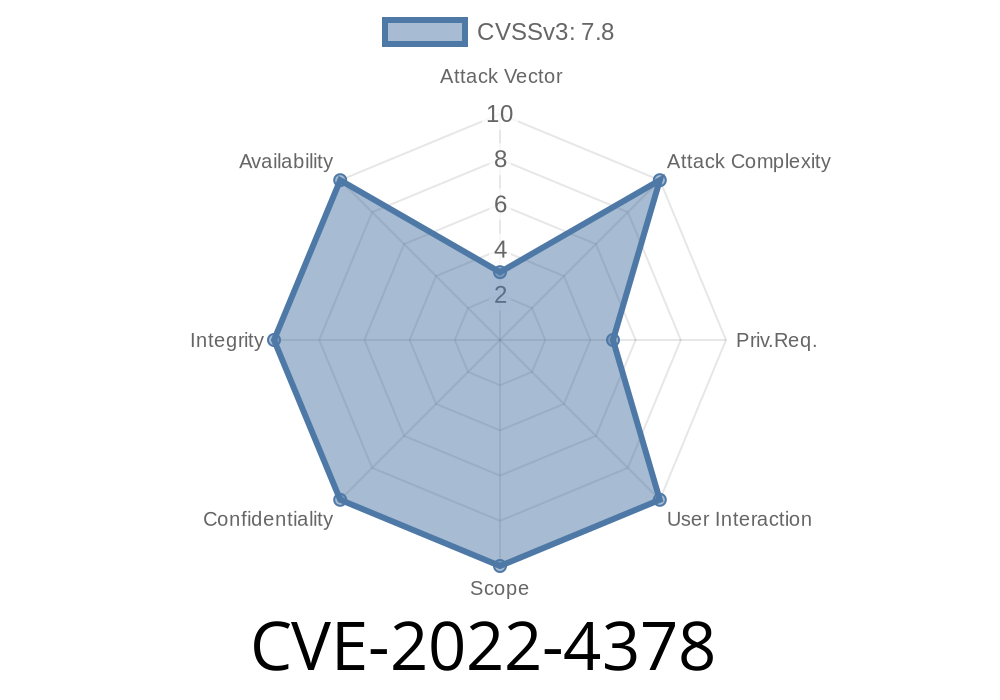Linux powers the backbone of everything from data centers to your home router. Its immense popularity makes any vulnerability a big deal, especially those that allow local users—not just remote hackers—to go from an ordinary account to full system control. One eye-catching example from recent years is CVE-2022-4378, a stack overflow vulnerability tied to the Linux kernel’s SYSCTL subsystem.
In this post, we’ll break down what happened, show code snippets, walk through exploit possibilities, share references, and suggest ways system admins can protect their systems.
What is CVE-2022-4378?
CVE-2022-4378 is a stack overflow discovered in the SYSCTL subsystem—the part of the Linux kernel that manages dynamic kernel parameter configuration through the /proc/sys directory and the sysctl command.
A bug in how certain parameters are handled means a local user (someone with a shell or physical access) can crash the system with a kernel panic. Even scarier, with some effort, this bug can be abused to escalate privileges—meaning an ordinary account could become root.
When you run a command like
sudo sysctl -w kernel.domainname="example.com"
the kernel reads and changes values in real time.
The vulnerable code, introduced in certain versions, failed to check the length of data copied into stack-allocated buffers. If a user supplied an overly long value, it could overwrite adjacent stack data—classic stack overflow.
Here’s a rough, commented version (in C) of the buggy logic
// Simplified and not exact, for illustration
#define BUFSZ 128
int sysctl_handler(char *user_value) {
char buf[BUFSZ];
// BAD: No check of user_value's length!
strcpy(buf, user_value);
// ... further processing ...
return ;
}
With input longer than 128 bytes, user data spills over into adjacent stack memory. Depending on what gets overwritten, you could see a kernel panic (crash) or, with enough trickery, manipulate execution flow.
The simplest exploit is crashing the box. From a user's shell
echo "A VERY VERY LONG STRING ..." > /proc/sys/kernel/domainname
or with sysctl
sudo sysctl -w kernel.domainname="$(python3 -c 'print("A"*300)')"
The above will trigger the fault in vulnerable kernel versions, leading to a panic and system reboot.
2. Local Privilege Escalation
Stack overflows can do more than crash: if an attacker crafts the overflow carefully, they may overwrite saved return pointers or function-local variables, causing the kernel to execute arbitrary code as root.
While no public ready-to-use LPE exploit is widely available for CVE-2022-4378 as of writing, the class of bug is well-exploited, and public write-ups such as Stack Clash show how attackers leverage similar flaws to get root. Advanced attackers could craft an exploit using return-oriented programming (ROP).
Reference Links
- CVE-2022-4378 on NVD
- Red Hat Security Advisory
- Upstream Kernel Patch Commit
- sysctl(8) man page
Look up your distro’s security advisories:
- Ubuntu Security Notices
- Red Hat CVE Database
Test on non-critical systems only:
You can try to write an oversized value via sysctl to a writable parameter, but beware: you *will* crash the box if it’s vulnerable.
Update your kernel:
All major Linux distros have shipped patches. Make sure your kernel is at least the patched release for your distro.
Block unprivileged kernel parameter writes:
Prevent untrusted users from writing sysctl keys, or limit access with SELinux, AppArmor, or file permissions.
- Consider Grsecurity / hardened kernels for environments with untrusted local users.
A local user can easily crash the system, or with enough skill, potentially become root.
- Exploit is simple when it comes to Denial of Service; Privilege Escalation, while theoretical, is plausible given attack history.
Patch as soon as possible.
Staying up to date and limiting who can mess with kernel parameters are the best ways to stay safe. For more technical details, read the upstream patch or the references above.
Timeline
Published on: 01/05/2023 16:15:00 UTC
Last modified on: 03/08/2023 18:15:00 UTC
